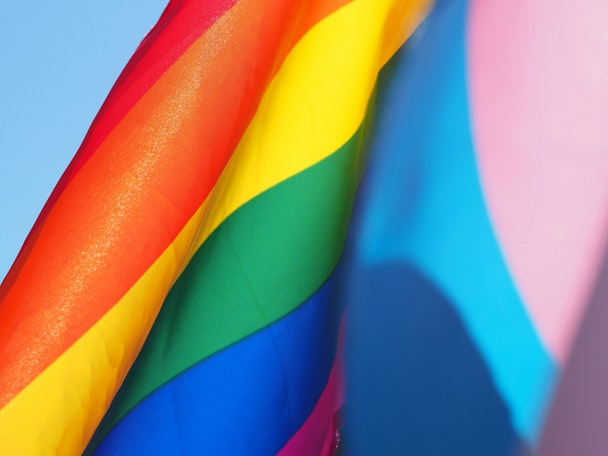Brand marketers confess why they chose to hide on Pride this year
On condition of anonymity, senior marketers open up about their decision not to be as loud and proud in their celebration of the LGBTQ+ community this year.

Marketers tell us why Pride feels different in 2024 / Upsplash
Compared with previous years, The Drum’s inbox was noticeably quiet this month. Unlike Pride 2023, when there were major campaigns from the likes of Verizon, Tinder, The North Face and Skittles, this year, there was relative silence from brands.
A lot has been written about brands retreating from marketing around Pride over fears of being called out for ‘pinkwashing’ or ’rainbow-washing,’ but it’s hard to really get under the skin of how marketers are feeling right now. When speaking to brand marketers about Pride, there will usually be a perfectly scripted line supporting the LGBTQ+ community, followed by the rebuttal that the fear of backlash wouldn't stop them from running campaigns.
Is that really all that went into their decision-making, however? The Drum decided to ask brands on condition of anonymity. Each of the marketers we spoke to has executed a Pride campaign, while every brand featured has sold a Pride product or merchandise. Their insights tell us that there is more to this story than simply the fear of backlash.
Explore frequently asked questions
The press got cynical
All the brands we spoke to did activate in some way around Pride this year, but a major difference was in how PR was used to promote it.
We asked a head of communications at a major apparel brand why they didn’t PR their Pride marketing this year and were told: “Journalists aren’t stupid and can see Pride PR campaigns for what they often are – a blatant attempt to get your brand in the paper off the back of a moment where groups that have been marginalized for centuries stand up to the discrimination they have faced.”
At his brand, the business has previously run Pride marketing campaigns, events, panel discussions and created bespoke products. Instead of proactively pitching stories about its activity to the press, he now only does reactive stories with journalists who have found out about the work organically.
“This is going to sound counter-intuitive, given my job, but to be honest, I find it a bit galling to PR moments in the year such as Pride. It seems like brands can use – dare I say, exploit? – these kinds of sensitive moments for their own marketing gain, rather than what they should be about. It is basically rainbow capitalism at its worst.”
Advertisement
LGBTQ+ marketing is no longer just about Pride month
Speaking to a senior marketer at another global apparel brand, a timeline of the “peaks and troughs” of activating around Pride emerged. “There was a point in time when, if you didn’t have a Pride campaign or collection, you would get called out for not having one,” she told us.
“But when brands started to be accused of Pridewashing, that turned into, ‘OK, you’ve got a Pride campaign, but what are you doing? Who are you donating to and what are your internal policies.’
“In the last two years, the way people show up has really softened. Pride is still something that our brand still activates around; we have a collection and donate etc.” The difference, however, is that brands are no longer “shouting” about it as much. “It has almost become the minimum everyone should be doing all year round. It’s not a distinctive asset to have a Pride campaign every June.”
LGBTQ+ marketing at this brand has evolved into always-on campaigns, largely led by the LGBTQ+ content creators it has on its books. “Four or five years ago, it would have been a key story on the brand map. Senior management would have rallied everyone behind the Pride campaign and amped up the level of investment behind it. But we don’t really have that any more. It’s a story. It’s there. We will drive it. But it’s not where we are putting our efforts.”
Advertisement
An ‘arduous’ sign-off process
The boycott against Bud Light last year after the beer maker partnered with trans influencer Dylan Mulvaney is cited as the key incident leading brands to shy away from supporting the LGBTQ+ community. The case of Bud Light wasn’t just a PR crisis but a legal and business disaster, with analysts reporting a $395m decline in sales because of the scandal.
One conglomerate FMCG marketer, who previously reveled in working on Pride and purpose campaigns, says campaigns in 2024 are “different gravy.” The reality, she told us, is that “due to major missteps from other brands, influencer vetting is now an arduous process and often legal teams are at the center of planning, which has never been the case previously.”
Consumer boycotts have led to a “fear of activating in this space and the fun element to Pride marketing is sadly absent,” the marketer added. “As a result, campaigns are now mostly focused inwards, with an internal pride network driving the way.”
Suggested newsletters for you
Could the backlash embolden brands?
The co-founder of a sustainable FMCG company meanwhile rejected the idea that backlash against Pride campaigns has made brands more risk-averse, but rather the opposite. “What happened with Bud Light made me want to do more stuff in this space; it was all so ridiculous,” he explained. In fact, his company reached out to Dylan Mulvaney to make a follow-up campaign to signal support to the trans community and he added that it was a “real shame” that corporations such as Bud Light, as well as Disney and Target which also faced Pride backlash last year, ended up “capitulating to the wrong side.”
In 2021, his brand sold a Pride flag version of its product and is considering bringing back a tweaked version for next year’s Pride. However, he told us, there is one reservation about a recent post that advocated for Pride being an all-year-round celebration, not just in June. The concern wasn’t out of fear of backlash but instead whether it would be “unnecessarily aggressive toward brands that were activating around Pride.”
As another year’s Pride wraps, it will be interesting to follow whether brands do shift into year-round marketing or if the silence around Pride month signals a retreat from supporting the LGBTQ+ community.
